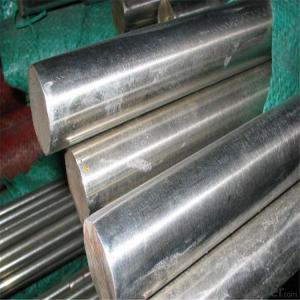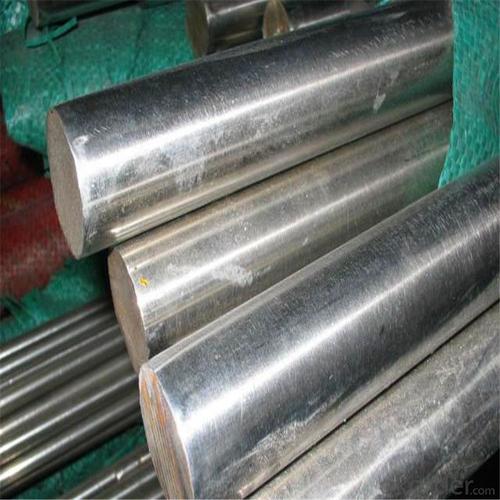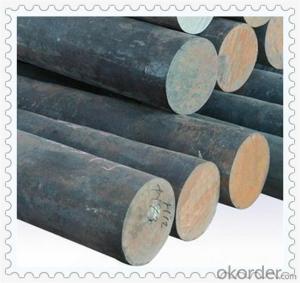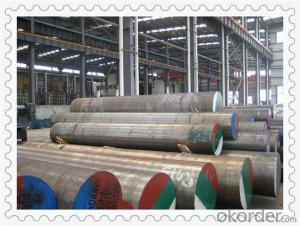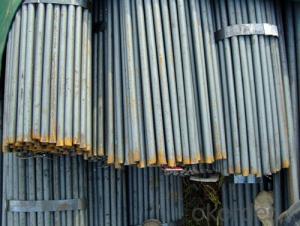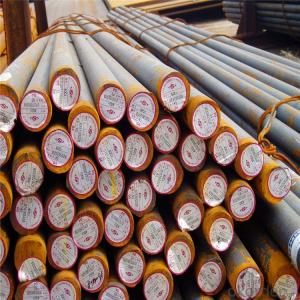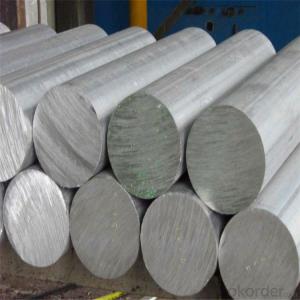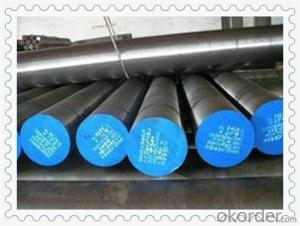Hot Rolled Carbon Steel Round Bar SAE1045 ASTM1045
- Loading Port:
- Tianjin
- Payment Terms:
- TT OR LC
- Min Order Qty:
- 100 m.t.
- Supply Capability:
- 500000 m.t./month
OKorder Service Pledge
OKorder Financial Service
You Might Also Like
Specification
Hot Rolled Carbon Steel Round Bar SAE1045 ASTM1045
Product Description of Hot Rolled Carbon Steel Round Bar SAE1045 ASTM1045
1. Steel grade: SAE1045, 45#, C45, S45C
2. Length: 6M-12M
3. Diameter: 16mm-300mm
4. Product range: round bar, flat bar, square bar
5. Technique: Hot rolled, forged, cold drawn
Specification of Hot Rolled Carbon Steel Round Bar SAE1045 ASTM1045
Material | SAE45 | 16-300mm | ||
Process | EAF + LF + VD + Forged + Heat Treatment (optional) | Length (mm) | Max 12m | |
Heat treatment | Normalized / Annealed / Quenched / tempered | Flat bar | Thickness(mm) | 8-500mm |
Delivery condition | Hot forged +Rough machined (black surface after Q/T)+ Turned (optional) | Width(mm) | 70-200mm | |
Test | Ultrasonic test according to SEP 1921-84 D/d | Length (mm) | Max 12m |
Chemical Composition of Hot Rolled Carbon Steel Round Bar SAE1045 ASTM1045
C | Si | Mn | Cr | Ni | Cu |
0.40~0.49 | 0.17~0.37 | 0.35~0.65 | ≤0.25 | ≤0.30 | ≤0.25 |
Photo Show of Hot Rolled Carbon Steel Round Bar SAE1045 ASTM1045
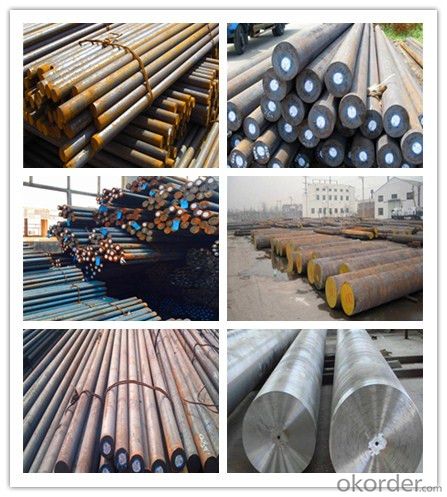
Packing and Delivery:
Packing in bundle package, or as customer's requirements.
Delivery Detail: 45 days after receiving the deposit.
Usage and Applications of Hot Rolled Carbon Steel Round Bar SAE1045 ASTM1045
1. Steel round bar is used in a large number of architectural and engineering structures. Or it can be used in construction of plants for the production of steel house frames, high-voltage transmission towers, bridges, vehicles, boilers, containers, ships, etc.
2. And we can use this kind of product on the performance of the mechanical parts if the demand is not very high.
3. Some special material steel round bar can be used for main shaft of steamer, hummer shank, with big section and supper force.
Company Information
CNBM International Corporation is the most important trading platform of CNBM group.
Whith its advantages, CNBM International are mainly concentrate on Cement, Glass, Iron and Steel, Ceramics industries and devotes herself for supplying high qulity series of refractories as well as technical consultancies and logistics solutions.


F A Q
1, Your advantages?
professional products inquiry, products knowledge train (for agents), smooth goods delivery, excellent customer solution proposale
2, Test & Certificate?
SGS test is available, customer inspection before shipping is welcome, third party inspection is no problem
3, Factory or Trading Company?
CNBM is a trading company but we have so many protocol factories and CNBM works as a trading department of these factories. Also CNBM is the holding company of many factories.
4, Payment Terms?
30% TT as deposit and 70% before delivery.
Irrevocable L/C at sight.
5, Trading Terms?
EXW, FOB, CIF, FFR, CNF
6, After-sale Service?
CNBM provides the services and support you need for every step of our cooperation. We're the business partner you can trust.
For any problem, please kindly contact us at any your convenient time.
We'll reply you in our first priority within 24 hours.
- Q: Can steel round bars be used in corrosive environments?
- Steel round bars can be used in corrosive environments, but their suitability depends on the specific type of steel and the severity of the corrosion. Stainless steel round bars, for example, are known for their excellent corrosion resistance and are commonly used in corrosive environments such as marine applications, chemical processing plants, and wastewater treatment facilities. These bars are typically alloyed with elements like chromium and nickel, which form a protective layer on the steel surface, preventing corrosion. However, carbon steel round bars are more prone to corrosion and may not be suitable for highly corrosive environments without proper coatings or treatments. In such cases, it is important to consult with experts or engineers to select the appropriate steel grade and take necessary precautions to ensure the longevity and performance of steel round bars in corrosive environments.
- Q: Are steel round bars suitable for machining applications?
- Yes, steel round bars are suitable for machining applications. Steel round bars are known for their excellent machinability, which means they can be easily shaped, cut, and drilled using various machining techniques such as turning, milling, drilling, and grinding. They are commonly used in industries such as automotive, aerospace, construction, and manufacturing, where precision and durability are crucial. Steel round bars offer high strength, toughness, and resistance to wear, making them ideal for machining applications that require high-performance components or parts. Additionally, steel round bars are available in a wide range of grades and sizes, allowing for versatility in meeting specific machining requirements.
- Q: Can steel round bars be heat treated to enhance their properties?
- Steel round bars can undergo heat treatment to improve their properties. This process involves controlled heating and cooling to modify the microstructure of the steel, ultimately enhancing its mechanical properties like strength, hardness, toughness, and ductility. Various heat treatment methods can be employed based on the desired outcome. One commonly used method is quenching and tempering. This involves heating the steel to high temperatures, forming a uniform austenitic structure, then rapidly cooling it in oil or water to transform the austenite into a stronger structure called martensite. However, martensite can be brittle, so the steel is subsequently tempered by reheating it at lower temperatures to reduce brittleness while maintaining the desired hardness. Another method is annealing, where the steel is heated to a specific temperature and slowly cooled to relieve internal stresses and enhance ductility. This process also refines the grain structure of the steel, improving machinability and formability. Furthermore, there are other heat treatment methods like normalizing, stress relieving, and case hardening, each tailored to enhance specific properties of steel round bars. Overall, heat treatment is a versatile and effective technique for enhancing the properties of steel round bars, enabling them to meet specific requirements in industries such as manufacturing, construction, automotive, and aerospace.
- Q: What is the difference between a forged and a peeled steel round bar?
- Both forged steel round bars and peeled steel round bars are utilized in various industries for different purposes. However, there exist notable distinctions between the two concerning their manufacturing procedures and physical attributes. To produce a forged steel round bar, a solid steel billet is heated to a high temperature and then shaped into the desired form by applying pressure. This process involves the use of machinery, such as hammers or presses, to shape the steel and create the round bar. The forging process enhances the strength and durability of the steel, making it suitable for applications that demand high strength and resistance to wear and tear. In contrast, a peeled steel round bar is manufactured using a different process called peeling or turning. During this procedure, a solid steel bar is rotated against a cutting tool, which eliminates the outer layer of the bar, resulting in a smooth and precise surface finish. Peeling eliminates any surface defects or imperfections present in the original bar, thereby enhancing its dimensional accuracy and surface quality. Regarding physical characteristics, forged steel round bars typically possess a rougher surface texture due to the nature of the forging process. This rough texture can provide improved grip or adhesion in certain applications. Additionally, forged bars often exhibit a denser and more uniform internal grain structure, contributing to their superior mechanical properties. On the other hand, peeled steel round bars exhibit a smooth and shiny surface finish as a consequence of the peeling process. This smooth surface makes peeled bars suitable for applications that prioritize aesthetic appeal or require a low coefficient of friction. However, the peeling process may result in a minor reduction in the overall diameter of the bar. In conclusion, the primary distinction between a forged and a peeled steel round bar lies in their manufacturing processes and resulting physical attributes. Forged bars are created through the application of pressure, resulting in a rougher surface texture and superior mechanical properties. Peeled bars, on the other hand, are produced by removing the outer layer of a steel bar, resulting in a smooth surface finish and improved dimensional accuracy. Ultimately, the choice between these two types of bars depends on the specific requirements of the application at hand.
- Q: How are steel round bars used in the mining industry?
- Steel round bars are commonly used in the mining industry for various applications such as drilling, excavation, and support structures. These bars are used as drill bits, anchor bolts, and reinforcement elements in underground mines and open-pit mining operations. Their high strength and durability make them suitable for withstanding the harsh conditions and heavy loads encountered in mining activities. Additionally, steel round bars are also utilized in the construction of mining equipment and machinery for their ability to provide structural integrity and stability.
- Q: Can steel round bars be used in food processing industries?
- Steel round bars are indeed suitable for use in food processing industries. The food industry often opts for steel as it offers exceptional durability, strength, and resistance against corrosion. Food processing equipment, such as mixers, conveyors, grinders, and slicers, can incorporate steel round bars. Moreover, steel round bars are also applicable in the creation of food storage containers, shelves, and racks. Nonetheless, it is crucial to guarantee that the steel employed in food processing industries adheres to food-grade standards, ensuring utmost hygiene and safety.
- Q: What are the different types of steel round bars used in the manufacturing of tools?
- In tool manufacturing, a variety of steel round bars are commonly employed. Each type of steel possesses distinct properties and qualities that make it suitable for various applications. The following are some of the most frequently utilized steel round bars in tool manufacturing: 1. Carbon Steel Round Bars: These round bars are widely used in tool manufacturing due to their exceptional strength and durability, making them ideal for heavy-duty applications. Carbon steel round bars can be further categorized into low carbon, medium carbon, and high carbon steel, based on their carbon content. 2. Alloy Steel Round Bars: Alloy steel round bars are created by incorporating diverse alloying elements, such as manganese, chromium, nickel, or molybdenum, into carbon steel. This process enhances their strength, hardness, and resistance to wear and tear. Cutting tools, drills, and gears are commonly manufactured using alloy steel round bars. 3. Stainless Steel Round Bars: Stainless steel round bars are renowned for their resistance to corrosion and high tensile strength. They are frequently employed in the production of tools that require protection against rust, such as kitchen knives, surgical instruments, and automotive components. 4. Tool Steel Round Bars: Tool steel round bars are specifically designed for tool manufacturing, as the name suggests. They possess high hardness, wear resistance, and toughness, making them ideal for cutting, drilling, and shaping applications. Tool steel round bars can be further classified into various types, including high-speed steel (HSS), cold work steel, hot work steel, and shock-resistant steel, based on their specific properties. 5. Stainless Tool Steel Round Bars: Stainless tool steel round bars combine the qualities of stainless steel and tool steel. They offer good resistance to corrosion and wear, making them suitable for applications that require both properties, such as the production of molds and dies. These examples represent just a few of the diverse types of steel round bars employed in tool manufacturing. The choice of steel depends on the specific requirements of the tool and its intended application.
- Q: How do steel round bars compare to wood round bars?
- There are several distinct differences that set steel round bars apart from wood round bars. Firstly, steel round bars are much stronger and more durable compared to their wooden counterparts. With a higher tensile strength, steel can withstand heavy loads and resist bending or breaking. This makes steel round bars ideal for applications in construction, engineering, or manufacturing, where strength and durability are paramount. On the other hand, wood round bars have their own advantages. Being a natural material, wood is lightweight and easy to work with. It can be easily cut, shaped, and crafted to meet specific requirements. Additionally, wood has a warm and aesthetic appeal that steel lacks, making it a popular choice in furniture, interior design, and other decorative applications. Another significant difference lies in their resistance to environmental factors. Steel is highly resistant to moisture, pests, and rot, making it suitable for outdoor or high-moisture environments. Conversely, wood is susceptible to these elements and needs regular treatment and maintenance to prevent damage. Cost is another factor to consider. Steel round bars are generally more expensive than wood round bars due to the higher cost of materials and production processes involved. Wood, being a natural resource, is often a more cost-effective option. Ultimately, the choice between steel and wood round bars depends on the specific requirements of the project. If strength, durability, and resistance to environmental factors are crucial, steel round bars are the preferable choice. However, if a lightweight, aesthetic, and cost-effective option is required, wood round bars may be more suitable.
- Q: What are the different machining processes used for steel round bars?
- Some of the different machining processes used for steel round bars include turning, milling, drilling, and grinding. Turning involves rotating the bar against a cutting tool to remove material and create a desired shape. Milling uses a rotating cutter to remove material from the surface of the bar. Drilling involves creating holes in the bar using a rotating drill bit. Grinding uses an abrasive wheel to remove material and achieve a smooth surface finish on the bar. These processes are commonly used in metalworking industries to shape and refine steel round bars for various applications.
- Q: What are the advantages of using nickel-cobalt alloy steel round bars?
- There are several advantages of using nickel-cobalt alloy steel round bars: 1. High Strength: Nickel-cobalt alloy steel round bars offer exceptional strength and toughness, making them suitable for applications that require heavy-duty performance. The addition of nickel and cobalt enhances the overall strength and hardness of the steel, allowing it to withstand high stress and pressure. 2. Corrosion Resistance: Nickel-cobalt alloy steel possesses excellent resistance to corrosion and oxidation. This makes it a preferred choice in environments where exposure to moisture, chemicals, or harsh weather conditions is common. The alloy's resistance to corrosion ensures durability and longevity, reducing the risk of rust or deterioration. 3. Heat Resistance: Nickel-cobalt alloy steel round bars exhibit superior heat resistance properties. They can withstand high temperatures without losing their structural integrity, making them suitable for applications involving heat treatment, such as forging or welding. This heat resistance ensures that the bars maintain their mechanical properties even under extreme thermal conditions. 4. Wear Resistance: The combination of nickel and cobalt in the alloy enhances its wear resistance. Nickel-cobalt alloy steel round bars exhibit excellent resistance to abrasion, erosion, and fatigue, making them ideal for applications in industries such as mining, construction, and automotive, where wear and tear are common. 5. Machinability: Nickel-cobalt alloy steel round bars are relatively easy to machine and fabricate. This makes them suitable for various manufacturing processes, including cutting, drilling, and shaping. The alloy's machinability allows for efficient production and reduces manufacturing costs. 6. Versatility: Nickel-cobalt alloy steel round bars have a wide range of applications due to their versatile properties. They can be used in industries such as aerospace, marine, oil and gas, automotive, and power generation. The alloy's combination of strength, corrosion resistance, and heat resistance makes it adaptable to diverse environments and demanding applications. In summary, nickel-cobalt alloy steel round bars offer numerous advantages, including high strength, corrosion resistance, heat resistance, wear resistance, machinability, and versatility. These properties make them a preferred choice for various industrial applications, ensuring durability, reliability, and performance.
Send your message to us
Hot Rolled Carbon Steel Round Bar SAE1045 ASTM1045
- Loading Port:
- Tianjin
- Payment Terms:
- TT OR LC
- Min Order Qty:
- 100 m.t.
- Supply Capability:
- 500000 m.t./month
OKorder Service Pledge
OKorder Financial Service
Similar products
Hot products
Hot Searches
Related keywords
